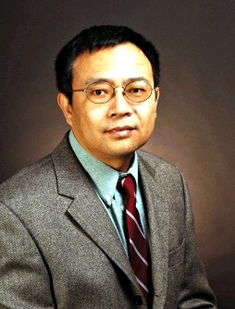
Engineering prof recognized for major contributions to technology advances
Posted: February 10, 2011
Arizona State University engineering professor Nongjian “NJ” Tao has been elected as a Fellow of the American Association for the Advancement of Science (AAAS).
The honor is bestowed on AAAS members judged by their peers to have made significant contributions to their fields of science and engineering.
The AAAS is the world’s largest general scientific society, and publisher of the prominent journal, Science.
Tao is a professor in the School of Electrical, Computer, and Energy Engineering, one ASU’s Ira A. Fulton Schools of Engineering, and director of the Center for Bioelectronics and Biosensors in ASU’s Biodesign Institute. He’s also an affiliated professor of chemistry and biochemistry, physics and material engineering.
Through his center, Tao leads research on technologies used to detect chemicals that can be a threat to human health, public safety and the environment.
“NJ Tao has demonstrated a tremendous versatility and a high level of creativity throughout his research career and in more recent accomplishments, particularly in ensuring our innovations reach the marketplace via the licensing of new technologies,” says Alan Nelson, executive director of the Biodesign Institute. “His body of work is emblematic of the core values of Biodesign Institute research — to solve major societal challenges with breakthrough achievements.”
Tao’s work focuses on molecular electronics, nanostructured materials and devices, chemical and biological sensors, interfaces between biological molecules and solid materials, and electrochemical nanofabrications.
He’s using his expertise to develop technologies designed to detect the presence of disease in the human body, the presence of pollutants in water and the atmosphere, and volatile organic compounds that can be used as chemical and biological warfare agents and explosives.
Much of his center’s work is supported by the National Science Foundation, the Department of Energy and the National Institutes of Health, including the National Institute of Environmental Health Sciences. Tao holds several U.S. patents related to his fields of expertise. Two of the patents have been licensed.
He is working with ASU colleagues on additional research to develop biosensors for mobile and home-based healthcare applications. Progress in this work can help meet many urgent health care needs around the world by enabling more rapid and accurate medical diagnoses.
A project Tao is leading to develop wearable environmental sensors was among the finalists for the 2010 Innovator of the Year Award for Academia presented as part of the annual Arizona Governor’s Celebration of Innovation.
The wearable and wireless chemical sensors are designed to quickly and reliably detect toxic chemicals in the air for use in health-risk assessment, disease prevention and monitoring of environmental conditions.
In 2010, Tao was elected to the Fellowship of the American Physical Society, one of the leading professional physics organizations in the world. He was chosen for “pioneering and innovative” contributions to chemical sensors, molecular and nano-electronics, and electrochemical-based nanofabrications.
Tao has more than 200 articles published in science and engineering journals and has presented almost 200 talks at science and engineering conferences throughout the world.
He joined the ASU faculty in 2001. Tao earned his Ph.D. in electrical engineering at ASU in 1988.




































